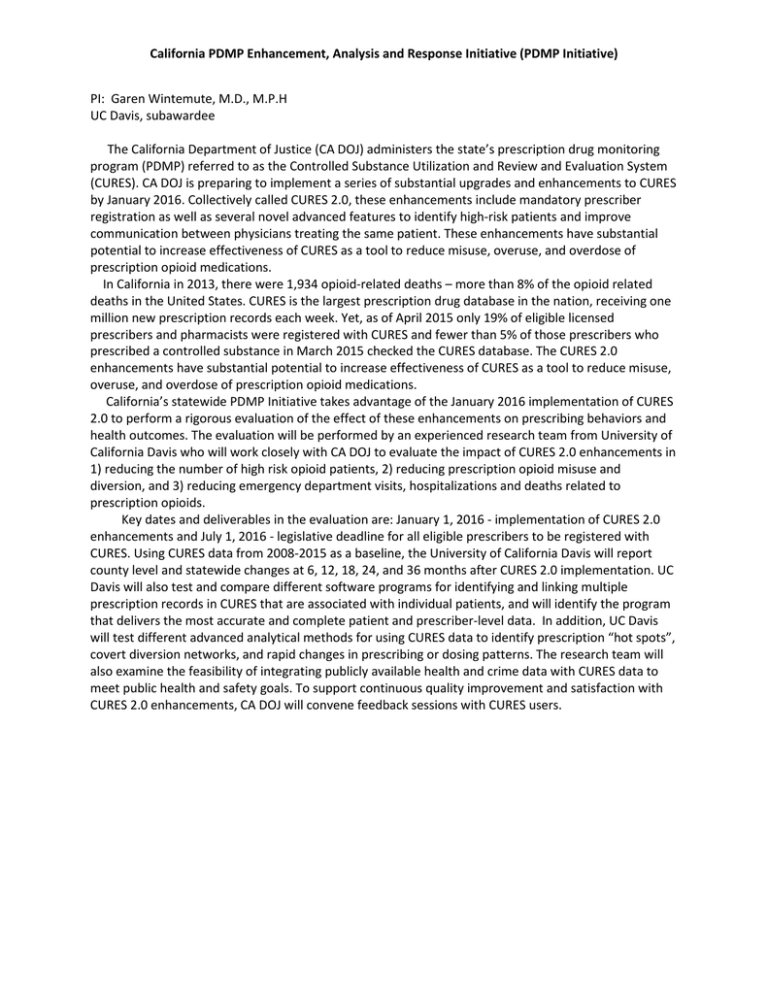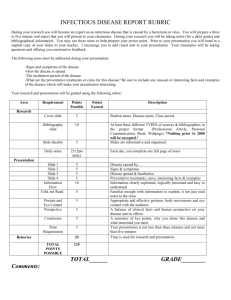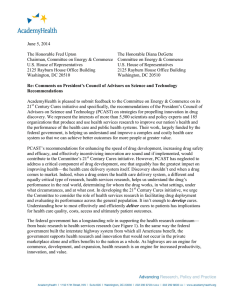California PDMP Enhancement, Analysis and Response Initiative (PDMP Initiative)
advertisement

California PDMP Enhancement, Analysis and Response Initiative (PDMP Initiative) PI: Garen Wintemute, M.D., M.P.H UC Davis, subawardee The California Department of Justice (CA DOJ) administers the state’s prescription drug monitoring program (PDMP) referred to as the Controlled Substance Utilization and Review and Evaluation System (CURES). CA DOJ is preparing to implement a series of substantial upgrades and enhancements to CURES by January 2016. Collectively called CURES 2.0, these enhancements include mandatory prescriber registration as well as several novel advanced features to identify high-risk patients and improve communication between physicians treating the same patient. These enhancements have substantial potential to increase effectiveness of CURES as a tool to reduce misuse, overuse, and overdose of prescription opioid medications. In California in 2013, there were 1,934 opioid-related deaths – more than 8% of the opioid related deaths in the United States. CURES is the largest prescription drug database in the nation, receiving one million new prescription records each week. Yet, as of April 2015 only 19% of eligible licensed prescribers and pharmacists were registered with CURES and fewer than 5% of those prescribers who prescribed a controlled substance in March 2015 checked the CURES database. The CURES 2.0 enhancements have substantial potential to increase effectiveness of CURES as a tool to reduce misuse, overuse, and overdose of prescription opioid medications. California’s statewide PDMP Initiative takes advantage of the January 2016 implementation of CURES 2.0 to perform a rigorous evaluation of the effect of these enhancements on prescribing behaviors and health outcomes. The evaluation will be performed by an experienced research team from University of California Davis who will work closely with CA DOJ to evaluate the impact of CURES 2.0 enhancements in 1) reducing the number of high risk opioid patients, 2) reducing prescription opioid misuse and diversion, and 3) reducing emergency department visits, hospitalizations and deaths related to prescription opioids. Key dates and deliverables in the evaluation are: January 1, 2016 - implementation of CURES 2.0 enhancements and July 1, 2016 - legislative deadline for all eligible prescribers to be registered with CURES. Using CURES data from 2008-2015 as a baseline, the University of California Davis will report county level and statewide changes at 6, 12, 18, 24, and 36 months after CURES 2.0 implementation. UC Davis will also test and compare different software programs for identifying and linking multiple prescription records in CURES that are associated with individual patients, and will identify the program that delivers the most accurate and complete patient and prescriber-level data. In addition, UC Davis will test different advanced analytical methods for using CURES data to identify prescription “hot spots”, covert diversion networks, and rapid changes in prescribing or dosing patterns. The research team will also examine the feasibility of integrating publicly available health and crime data with CURES data to meet public health and safety goals. To support continuous quality improvement and satisfaction with CURES 2.0 enhancements, CA DOJ will convene feedback sessions with CURES users.



